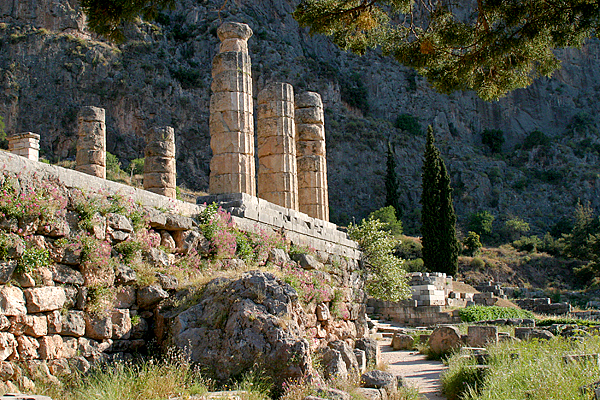
"And thence you went speeding swiftly to the mountain ridge, and came to Crisa beneath snowy Parnassus, a foothill turned towards the west: a cliff hangs over if from above, and a hollow, rugged glade runs under. There the lord Phoebus Apollo resolved to make his lovely temple, and thus he said: 'In this place I am minded to build a glorious temple to be an oracle for men, and here they will always bring perfect hecatombs, both they who dwell in rich Peloponnesus and the men of Europe and from all the wave-washed isles, coming to question me. And I will deliver to them all counsel that cannot fail, answering them in my rich temple.'"
Homeric Hymns: To Pythian Apollo (II.277-293)
"Rocky Pytho, holy Crisa" (Iliad, II.519) lay within the territory of Phocis, which had been heavily fined for cultivating land sacred to Apollo (c. 590 BC) after the First Sacred War had been fought to wrest Delphi from the control of Cirrha on the coast, which had been levying a heavy toll on pilgrims who came to visit the Temple of Apollo (Strabo, Geography, IX.3.4).
Pausanias, writing in the second century AD, relates that the Phocians had been forced to join the Persians when Xerxes crossed the Hellespont (Description of Greece, X.2.1–X.3.4). Although they subsequently allied themselves with the Greeks at the Battle of Plataea, a substantial fine was levied on the Phocians by other members of the Amphictyonic League, an alliance that had been founded to protect the Temple of Apollo at Delphi. Resenting the heavy penalty, Philomelus persuaded his countrymen to seize the sanctuary, "pointing out that the amount of the sum to be paid was beyond their resources." They did so in 357 BC and quickly were joined by Greek mercenaries, who were paid from the treasury of the temple. Its offerings and dedications, including the golden tripod, were melted down and distributed (X.13.9). The next year, Thebes, the dominate member of the League, contested this sacrilege, so beginning the Third Sacred War.
After being defeated in battle in 354 BC, Philomelus killed himself and was succeeded by Onomarchus, who, fleeing, was slain by his own troops, resentful of his incompetence as a general. Command passed to his brother and then to his brother's son, who was "accused of appropriating to his own use the sacred treasures." Both died in their turn. In 346 BC, Philip II of Macedonia intervened and put an end to the war, which had lasted ten years. The cities of Phocia were razed and the Phocians expelled from the League and deprived both of their share in the sanctuary at Delphi and the Greek assembly, their votes being given to the Macedonians. Eventually, the cities were rebuilt and "No Greeks were keener defenders against the Gauls and the Celtic invaders than were the Phocians."
The Temple of Apollo at Delphi is pictured, the base of the Serpentine Column that once held the golden tripod just visible at the end of the path.
References: The Homeric Hymns and Homerica (1914) translated by Hugh G. Evelyn-White (Loeb Classical Library). The Third Sacred War (356-346 BC) is related principally by Pausanias, Description of Greece (X.2-3) and Diodorus Siculus, Library of History (XVI.23-40), as well as Strabo (Geography, IX.3.9).